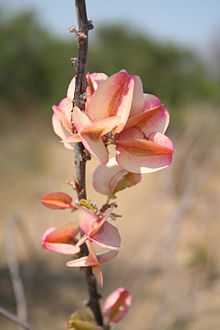Samara (fruit)

A samara is a winged achene, a type of fruit in which a flattened wing of fibrous, papery tissue develops from the ovary wall. A samara is a simple dry fruit and indehiscent (not opening along a seam). The shape of a samara enables the wind to carry the seed farther away than regular seeds from the parent tree:
- The seed can be in the centre of the wing, as in the elms (genus Ulmus), the hoptree (Ptelea trifoliata), and the bushwillows (genus Combretum).
- The seed can be on one side, with the wing extending to the other side, making the seed autorotate as it falls, as in the maples (genus Acer) and ashes (genus Fraxinus).
A samara is sometimes called a key and is often referred to as a wingnut, helicopter, whirlibird, whirligig, polynose, or, in the north of England, a spinning jenny. During the autumn months, they are a popular source of amusement for children who enjoy tossing them in the air and watching them spin to the ground.
Some species that normally produce paired samaras, such as Acer pseudoplatanus, also produce them in groups of 3 or 4.
-

Unusual group of three samaras of sycamore maple (Acer pseudoplatanus. They are normally paired)
-

Seeds of the tropical ash (Fraxinus uhdei)
-

The hoptree (Ptelea trifoliata)
-

The Siberian elm (Ulmus pumila)
Further reading
- Spinning Flight : Dynamics of Frisbees, Boomerangs, Samaras and Skipping Stones, Ralph Lorenz, Copernicus New York, September 2006 ISBN 0-387-30779-6
| Wikimedia Commons has media related to: |
| ||||||||||||||
